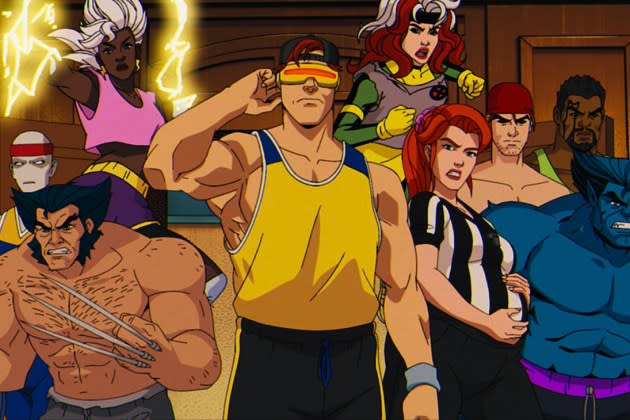‘X-Men ’97’ Review: Disney+’s Series Strikes a Winning Balance Between Fond Nostalgia and Fresh Pizzazz

If you are a millennial of a certain age, there’s a good chance Disney+’s X-Men ’97 will evoke nostalgic chills almost without trying: The theme song alone, borrowed from the original X-Men: The Animated Series, will be enough to transport some of us, Ratatouille-style, into memories of Saturday mornings bingeing cartoons over sugar cereal.
But as demonstrated by one failed remake or middling reboot after another, getting people to remember they used to like a show is one thing. Getting those people to fall in love with it again, and recruit new fans along the way, is entirely another. It is, then, a testament to the precision of X-Men ’97‘s balancing act that it actually pulls it off. The animated series is a throwback in the most ideal sense — so vintage, it comes all the way back around to feeling fresh again.
More from The Hollywood Reporter
Marvel Shocker: 'X-Men '97' Creator Beau DeMayo Fired Weeks Before Premiere (Exclusive)
Jon Hamm "Would Love" a Role in the MCU: "I Hope I Get a Chance"
Though it’s billed as a continuation of The Animated Series, X-Men ’97 thankfully does not require brushing up on intricate lore from the tail end of the last century. Nor does it bother with origin stories and previously-ons. Creator Beau DeMayo correctly assumes instead that most audiences in 2024 will be familiar with the basic concept of the X-Men, who’ve been the subject of more than a dozen live-action features and spinoffs since the cartoon went off air. Other necessary specifics are sprinkled in via expository dialogue, much of it directed at Roberto (Gui Agustini) — a recurring mutant character who, paralleling the introduction of Jubilee (Holly Chou in this iteration) in 1992, conveniently knows nothing about the X-Men before he’s saved by them in the opening minutes of the premiere.
Besides, the story picks up at a point so pivotal it feels like a new beginning. As X-Men ’97 gets going, the team are still reeling from the loss of their idealistic leader and founder, Charles Xavier (Ross Marquand), whose near-death closed out the 1997 Animated Series finale. Nevertheless, they’ve pressed on in their work under the shakier leadership of Xavier’s laser-eyed protégé Cyclops (Ray Chase), and the three episodes sent to critics (out of 10) are spent going about X-Men business as usual: saving the world while also saving themselves and their own kind from the rest of the world, given that a not-insubstantial proportion of humans regard mutants as an existential threat.
The plight of the X-Men echoes any number of real-world instances of injustice, and, as a metaphor, that flexibility plays as both a strength and a weakness. On one hand, the theme is more durable for being so infinitely applicable. When Roberto protests that he was “born this way” or a sneering bigot tells weather goddess Storm (Alison Sealy-Smith) that tolerance is only “a fad,” those moments draw power from the connections we make in our own minds to the oppression of queer people, people of color, women and so on. On the other, the pointedness of the series’ commentary feels less effective for being rather vague — though X-Men ’97‘s choice to sideline the conciliatory Xavier while pushing his more militant bestie, Magneto (Matthew Waterson), to the forefront does seem appropriate for 2024’s intensely polarized atmosphere.
But if sociopolitical analysis is not X-Men ’97‘s forte, soapy shenanigans absolutely are. Watching the X-Men track down the extremists building anti-mutant Sentinels, or deploying their powers to save humans from rickety Ferris wheels, is nowhere near as fun as watching them simply bounce off each other within the headquarters/training ground/school/home they call the X-Mansion. In lighter moments, they tease each other over hash browns or vent their rivalries on the basketball court. In heavier ones, they brood over love triangles and a pregnancy and a shocking request left in a will. (The X-Men being who they are, those twists are further complicated by time travel, psychic manipulation and an evil doppelgänger.) All of this is pitched at precisely the tone between earnest and playful. X-Men ’97 knows exactly how over-the-top these storylines are, and it embraces their operatic quality without any of the self-conscious snark that’s defined so much of Marvel’s live-action output.
Indeed, part of what makes X-Men ’97 so fun is how much it doesn’t feel like the stuff we’ve been watching for the past two and a half decades of superhero dominance. It’s fleet on its feet, as opposed to the nine-figure blockbusters and hourlong dramas that account for so much superhero storytelling these days, and unladen with either Easter eggs or setup for spinoffs. (At least for now; we’ll see if the powers that be eventually fold these characters into the larger Marvel Cinematic Multiverse.) The series is sincere but not self-important, slightly silly but not embarrassed about it. Its bright, flat retro style — a bit more polished than the ’90s series, but otherwise of a piece with it — looks downright distinctive in a sea of “3D” animation and “realistic” CG.
Best of all, it works on its own terms. The series is part drama, part sitcom, part action fantasy, all wrapped up in a zippy half-hour package as accessible to the casual newcomer as it is to those who’ve been waiting 27 years to find out what happens next. Nostalgia for its own sake can be a trap, condemning once-beloved properties to retrace the same steps until they’re faint copies of themselves. X-Men ’97 escapes this fate by trying not to repeat the past, but to build forward from it — and in doing so, reminds us that a true classic stands the test of time.
Best of The Hollywood Reporter

 Yahoo News
Yahoo News 